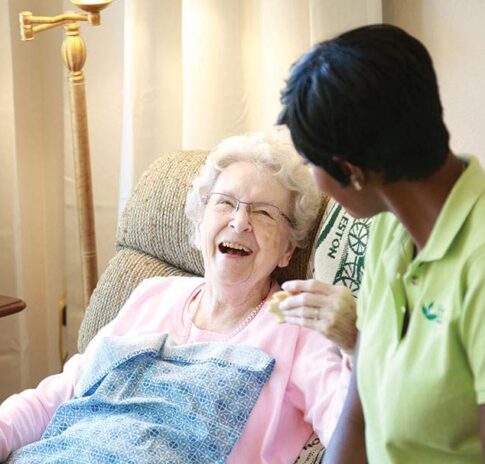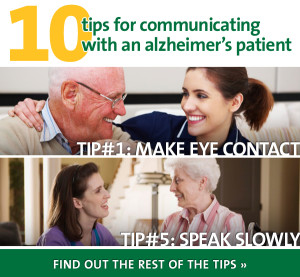Here at FirstLight Home Care, we work with lots of families caring for loved ones with many different diseases and disabilities. One disease that is particularly heart wrenching to watch and personally endure is Alzheimer’s. I have asked myself this question many times…as I get older “would I rather lose my physical capabilities or my memory?” That’s definitely not a fair choice to make. And, unfortunately we don’t get the choice. Life happens as it’s going to happen, and then in order to move on, we have to learn to adapt to a “new normal.” But, after talking to many families with loved ones dealing with Alzheimer’s, I am not sure if one can call day-to-day interactions with them to be a “new normal.” From one day to the next, life and their memory can be drastically different. It is extremely stressful and emotional for the families, as well as the patients.
The caregivers and families of Alzheimer’s patients have to relearn how to communicate with them. There are many questions to be asked about Alzheimer’s, and I would highly suggest that families with loved ones who are newly diagnosed with Alzheimer’s to also seek local support groups. Speaking to others dealing with the same situation can be very informative and therapeutic.
I would like to share with you some excellent communication tips from Carole Larkin’s blog post on the Alzheimer’s Reading Room. The Alzheimer’s Reading Room is the number one source of life news and information for the entire Alzheimer’s and Dementia community. The goal of the Alzheimer’s Reading Room is to Educate and Empower Alzheimer’s caregivers, families, and the entire Alzheimer’s community.
Tips for communicating with a mid-stage (or later) Alzheimer’s patients:
- Make eye contact. Always approach them face-to-face and make eye contact. Use their name if you need to. It is vital that they actually see you and that their attention is focused on you. Read their eyes. Always approach from the front as approaching and speaking from the side or from behind can startle them.
- Be at their level. Move your head to be at the same level as their head. Bend your knees or sit down to reach their level. Do not stand or hover over them – it is intimidating and scary. They can’t focus on you and what you are saying if they are focused on their fear.
- Tell them what you are going to do before you do it. Particularly if you are going to touch them. They need to know what is coming first so that they don’t think that you are grabbing them.
- Speak calmly. Always speak in a calm manner with an upbeat tone of voice, even if you don’t feel that way. If you sound angry or agitated, they will often mirror that feeling back to you and then some.
- Speak slowly. Speak at one half of your normal speed when talking to them. Take a breath between each sentence. They cannot process words as fast as non-diseased people can. Give them a chance to catch up to your words.
- Speak in short sentences. Speak in short direct sentences with only one idea to a sentence. Usually they can only focus on only one idea at a time.
- Only ask one question at a time. Let them answer it before you ask another question. You can ask who, what, where and when, but NOT why. Why is too complicated. They will try to answer, fail and get frustrated.
- Don’t say “remember.” Many times they will not be able to do so, and you are just pointing out to them their shortcomings. That is insulting, and can cause anger and/or embarrassment.
- Turn negatives into positives. For example say “Let’s go here” instead of “Don’t go there”. Be inclusive and don’t talking down to them as if they were a child. Respect the fact that they are an adult, and treat them as such.
- Do not argue with them. It gets you nowhere. Instead, validate their feelings, by saying” I see that you are angry (sad, upset, etc…). It lets them know that they are not alone and then redirect them into another thought. For example “It sounds like you miss your mother (husband, father, etc…). You love them very much, don’t you? Tell me about the time…” Then ask for one of their favorite stories about that person).

